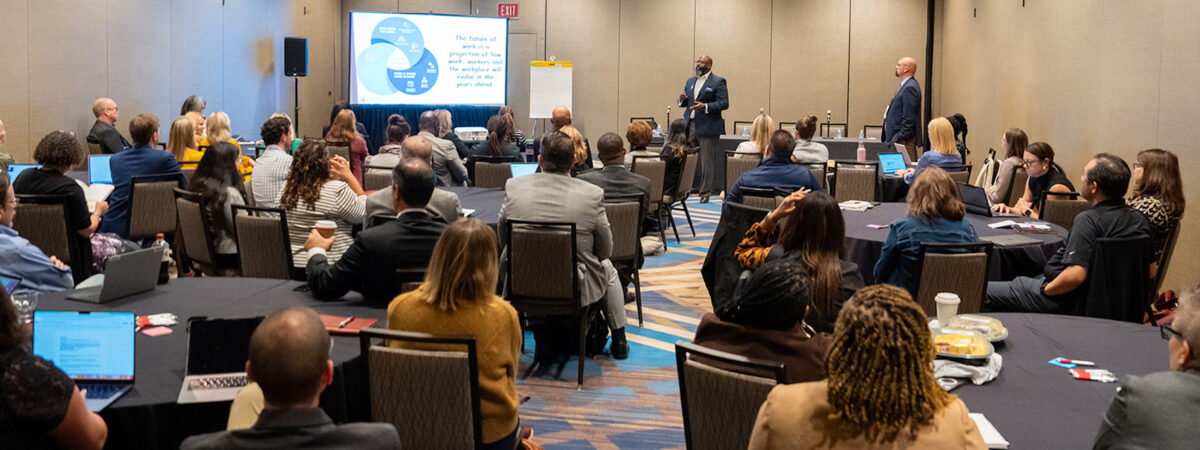
Enter: Inclusive Innovation. Digital Promise’s Center for Inclusive Innovation was formed with a mission focused on elevating the creativity and context expertise of communities and school districts to create equitable powerful learning opportunities for students furthest from opportunity. Since its founding, the Center for Inclusive Innovation has supported League of Innovative Schools districts in piloting and implementing innovative solutions to deeply equity-entrenched challenges in education.
Last month, the Center for Inclusive Innovation shone a spotlight on some of the promising solutions being implemented by district leaders at its annual convening, “Elevating the Ingenuity of Schools and Communities.” Numerous leaders from the League of Innovative Schools participated in sessions on a range of high-priority topics—from building a diverse, resilient teacher workforce to engaging community input to accelerate student learning recovery.
So how are these League districts thinking innovatively—through the lens of inclusivity and equity—about the future of education in their schools and across their communities? Read on to learn how.
Eighty-five percent of the jobs that will exist in 2030 haven’t been created yet. This statistic is front of mind for Dr. Michael Nagler, superintendent of Mineola Public Schools (New York)—and has in turn dramatically transformed how his district is redesigning high school to align with the workforce of the future. In a session alongside Dr. Baron Davis, senior advisor at Digital Promise, Nagler called attention to the World Economic Forum’s framework for Education 4.0. Launched in early 2023, this framework prioritizes the development of abilities, skills, attitudes, and values over solely content knowledge—a departure from traditional high school graduation requirements that have remained largely unchanged in the United States for more than 20 years.
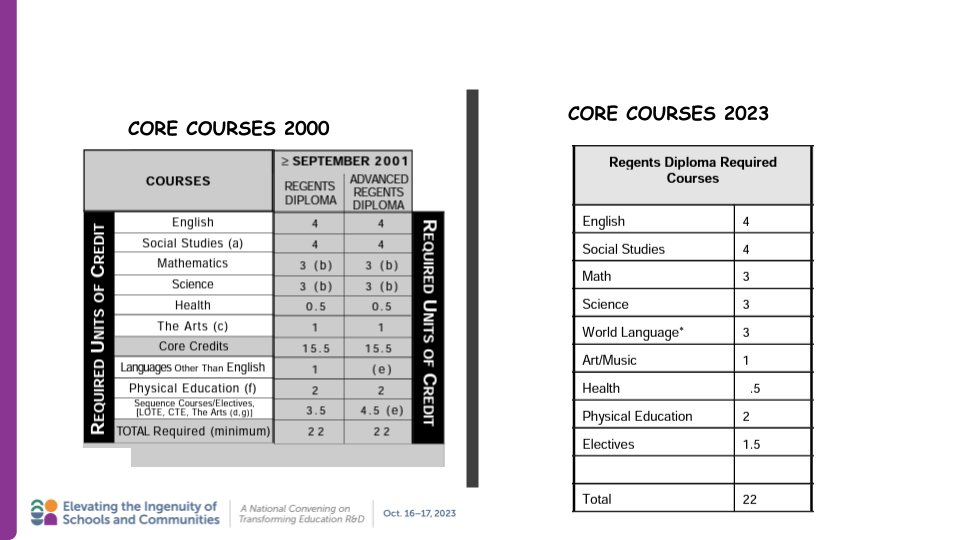
High School core courses – with examples pictured here from both 2000 and 2023 – have remained largely unchanged in the U.S. for the past two decades, signaling the need to revisit and adapt new standards that better prepare students to enter a workforce that is rapidly shifting.
In Mineola, this framework is evident in Synergy at Mineola High School, an “alternative offshoot” of the district’s high school which is designed to mirror the types of flexible learning and self-directed spaces that learners will encounter in college and their future workplaces. Adapted from an old bank, Synergy’s building was co-designed alongside students to facilitate interactive learning and leverages a new instructional model that gives students the opportunity to engage in computational thinking, earn digital badges, and more. The district has found that this model works particularly well for students who have struggled in more traditional learning environments that can lack autonomy and individualized learning.
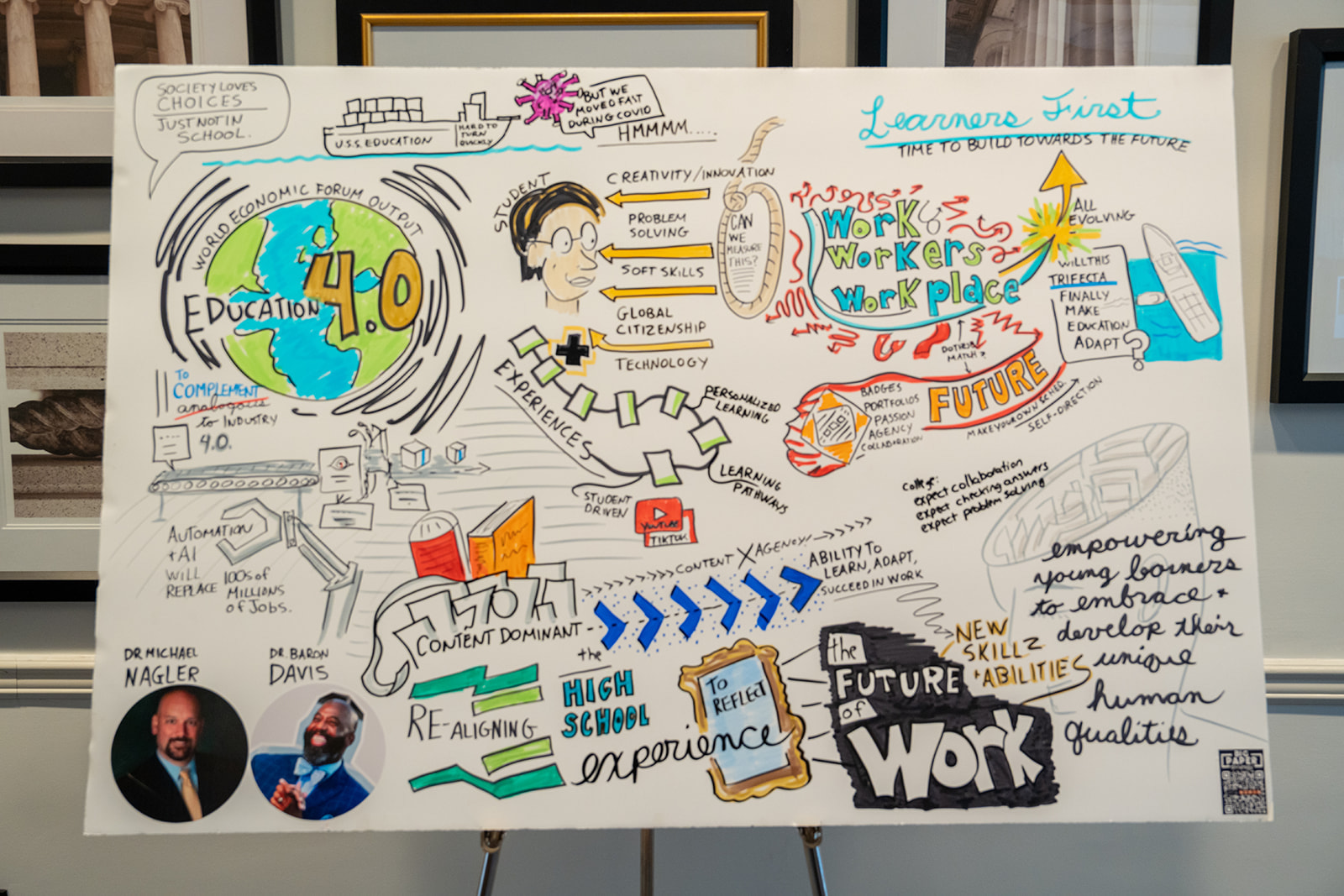
Key takeaways from “Realigning the High School Experience to Reflect the Future of Work,” presented by Mike Nagler and Baron Davis, are captured via this animation, created live during the session.
According to Nagler, Synergy is just one example of how learning can—and should—be adapted to meet the workforce of tomorrow, not today. In reflecting on how other districts can reimagine their own high school models, Nagler encourages an open-minded approach: “There are things we have to do and things we want to do; our job is to build a bridge.”
Talladega County Schools (Alabama) has a district mantra that drives every decision that they make: “Develop skills that will empower students to be good leaders.” That’s why when they had the chance to prepare their high school students for viable careers in cybersecurity, an industry that offers lucrative salaries and is eager to diversify, they jumped at the opportunity.
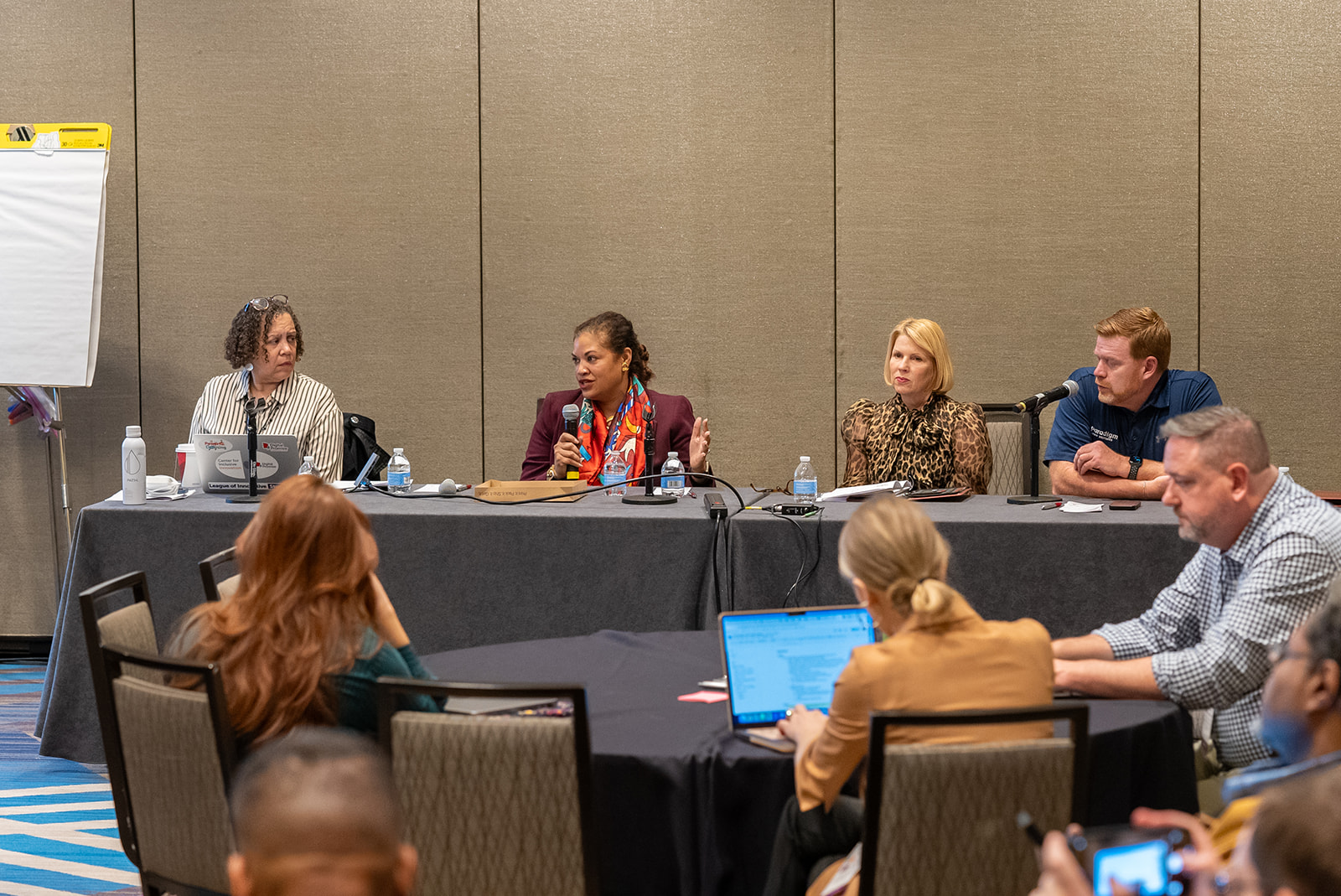
Kimberly Smith, chief inclusive innovation officer at Digital Promise, Lydia Logan, vice president of global education and workforce development at IBM, Dr. Suzanne Lacey, superintendent at Talladega County Schools, and Matt Miller, Co-CEO at Paradigm Cyber Ventures, participate in “National Cybersecurity Strategy: Scaling Inclusive Cyber Workforce Pathways.”
In 2022, Talladega County Schools joined the Center for Inclusive Innovation’s first Inclusive Cybersecurity Pathways cohort. Talladega was one of 11 League districts that partnered with the Center for Inclusive Innovation and Paradigm Cyber Ventures to offer a three-year cybersecurity pathway, with investment and access to workforce content from IBM, that intentionally recruits students who are often furthest from opportunity to equip them with the necessary certifications to gain viable, accessible jobs within the cybersecurity space. The result? A win-win for students and employers. Students gain transferable skills that prepare them for the shift toward a “skills-based economy” and can enter the workforce starting at $70,000 per year, and employers have access to a diverse, qualified talent pool. For Lydia Logan, vice president of global education and workforce development at IBM, a key to broadening the technology talent pool is exposing students early on to careers in technology that they might not have been aware of—and helping them to see themselves in these roles.
What does it look like for school systems of various sizes and compositions to address inequities in their districts? For participants in the Center for Inclusive Innovation’s Equitable Systems Transformation project, it starts with analyzing their system to identify conditions and shifts.
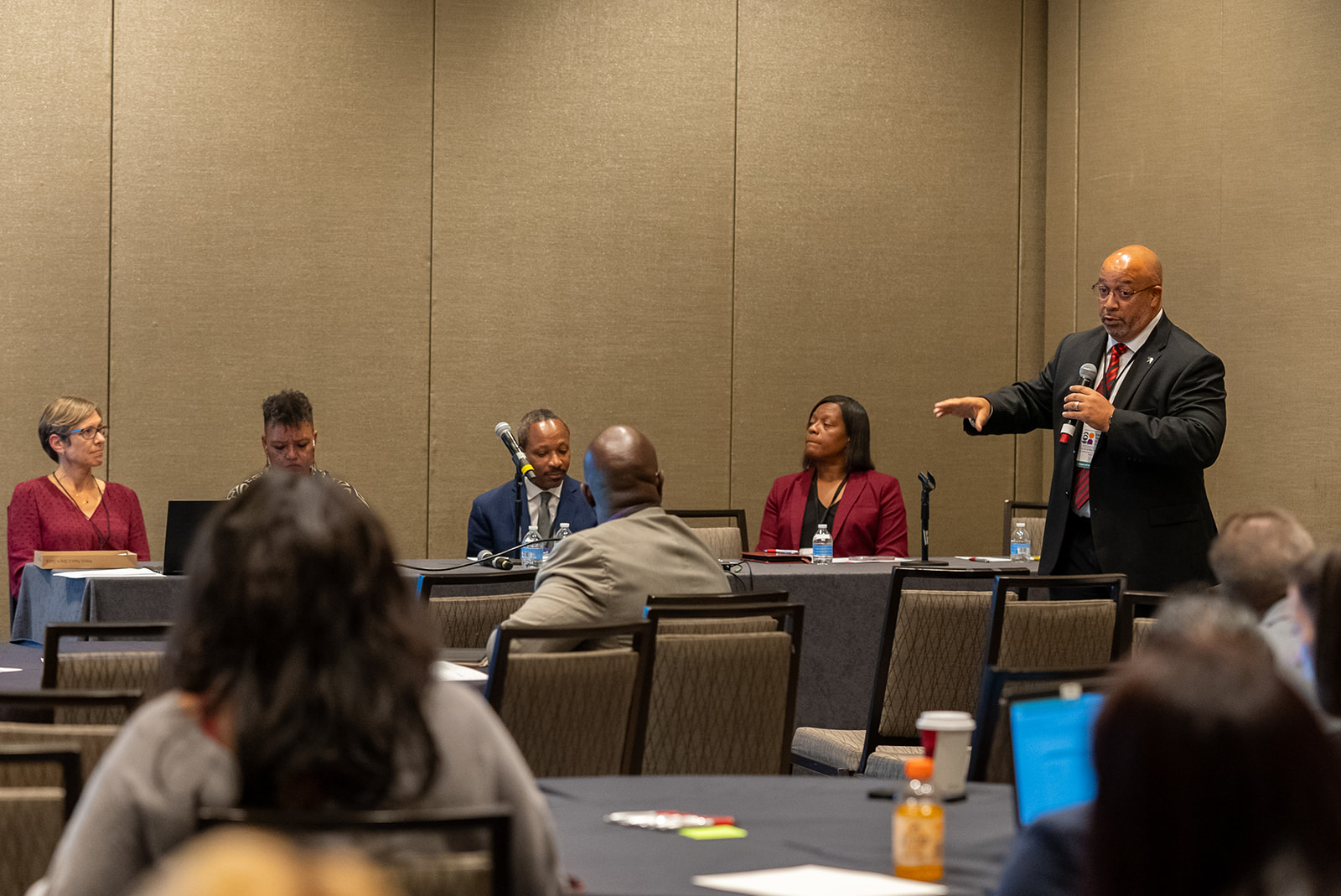
Jenny Bradbury, director of solutions and strategy growth at Digital Promise, facilitates a discussion with leaders from Princeton City Schools, including Kevin Jamison, Tonya Wright, and Elgin Card – and Dr. Lisa Williams, consultant at EMCS for “Exploring Princeton City’s Equitable School Systems Transformation Efforts and Advancing Your Own.”
In 2021, Princeton City Schools (Ohio) joined a cohort of eight League districts to co-create equitable systems with their families and communities. Princeton approached the project through the lens of professional learning, setting out to build capacity and cultural competency within the district to support the identity development and self-efficacy of their students of color. The process intentionally sought out and incorporated a diverse range of voices, primarily from parents, families, students, and the broader community. In doing so, they gathered unexpected yet instructive input that both informed systems-level change and resulted in actions that have been embraced across the district. These conversations helped Princeton to formalize feedback loops with mechanisms for strengthening relationships and school leadership accountability.
Want to explore opportunities around Inclusive Innovation for your own district? Learn about the Center for Inclusive Innovation’s current and past projects and email league@digitalpromise.org to learn how you can get involved with the League of Innovative Schools.